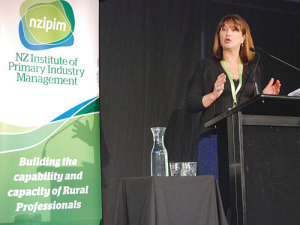Meat wellness, well done
Newly published research shows overseas consumers have a strong interest in improving their wellbeing through eating red meat, highlighting opportunities to achieve a premium for products with proven health benefits.
 Christine Pitt, of Meat & Livestock Australia, speaks at the New Zealand Institute or Primary Industry Management conference at Lincoln.
Christine Pitt, of Meat & Livestock Australia, speaks at the New Zealand Institute or Primary Industry Management conference at Lincoln.
Alternative proteins, meat-based snacks, insects, new types of packaging, eating on-the-go, 3D printing of food: change is coming fast and rural professionals need to get with it, says Meat & Livestock Australia’s Christine Pitt.
Notably in the Asian middle class, consumers are becoming much choosier and demanding higher environmental, social, health and wellbeing credentials from their food sources, Pitt says. They are looking for an experience, not just sustenance, from what they eat.
Pitt is MLA’s general manager value chain innovation, responsible for $45 million/year of R&D and commercialisation in the Australian red meat industry.
Speaking to the recent New Zealand Institute of Primary Industry Management conference at Lincoln, she warned of coming disruption.
“If you’re not completely on top of what’s happening with these new technologies then I suggest you’re probably not going to be able to deliver a good service to your clients.”
It is not just single technologies starting to emerge but their convergence -- how they will all work together -- that will fundamentally change the way farming is done.
Many new businesses, start-ups and entrepreneurs are entering the agribusiness sector, Pitt says.
“If you’re not already thinking about what these people are doing they’re going to displace you fairly quickly.”
However, she believes disruption is not all bad and represents some great opportunities.
Snacking, eating on-the-go and particularly protein snacks are a huge growth sector, with consumers starting to turn away from some traditional grain-based snacks they see as not healthy or too sweet.
For example, Epic, a Texas company recently bought by the food giant General Mills, makes a range of meat-based snack bars. These retail for the equivalent of about $100/kg of red meat -- some even for $180/kg.
“Why would you put another kilo of red meat in a box and call it ‘trim’ and sell it, or send it to the US and sell it for hamburger meat, when you can do this with it? It doesn’t make sense.”
These markets did not need to be invented, she added.
“Consumers around the world are shouting at us. This is the kind of thing they are looking for.
“What we know now is that consumers want to get their foods quite differently, they want to eat different foods, they want them produced in different ways,” Pitt explained.
“Asia is also driving a lot of this investment in new ventures. So if you thought Asia was a place where we go to tell them how to do things, think again. They’re already getting ahead of us.”
Pitt says smart people, smart companies and smart countries are starting to work out what they would do with all these trends, and that is the challenge for everyone.
Some of the big red meat companies are themselves starting to invest in alternative proteins.
“You used to be able to see out your career sticking to your knitting or defending your core business but it’s no longer going to be the case.”
Pitt said, at the risk of offending some of her audience, the days of thinking about R&D then R&D extension as separate steps, are dead. Rural professionals can no longer wait for research to be done then think about how to get “those dumb farmers” to adopt it.
“That’s not the way we are going to change the industry, and if you are a rural professional who thinks that’s your job, it’s time to panic because that doesn’t work. We now must have a much more dynamic systems-based approach to how we work together with producers, researchers, scientists and technology companies and how we work in terms of bringing all that together so it’s a natural dynamic thing that’s happening all the time.”
Who's NZIPIM?
The New Zealand Institute of Primary Industry Management (NZIPIM) is the peak industry body for the rural profession, with at least 1000 members from a range of occupations including farm management advisors, rural bankers, farm accountants, fertiliser consultants, rural valuers, representatives from industry good organisations, CRIs, universities, and agribusiness service providers.
Global trade has been thrown into another bout of uncertainty following the overnight ruling by US Supreme Court, striking down President Donald Trump's decision to impose additional tariffs on trading partners.
Controls on the movement of fruit and vegetables in the Auckland suburb of Mt Roskill have been lifted.
Fonterra farmer shareholders and unit holders are in line for another payment in April.
Farmers are being encouraged to take a closer look at the refrigerants running inside their on-farm systems, as international and domestic pressure continues to build on high global warming potential (GWP) 400-series refrigerants.
As expected, Fonterra has lifted its 2025-26 forecast farmgate milk price mid-point to $9.50/kgMS.
Bovonic says a return on investment study has found its automated mastitis detection technology, QuadSense, is delivering financial, labour, and animal-health benefits on New Zealand dairy farms worth an estimated $29,547 per season.

OPINION: Here w go: the election date is set for November 7 and the politicians are out of the gate…
OPINION: ECan data was released a few days ago showing Canterbury farmers have made “giant strides on environmental performance”.